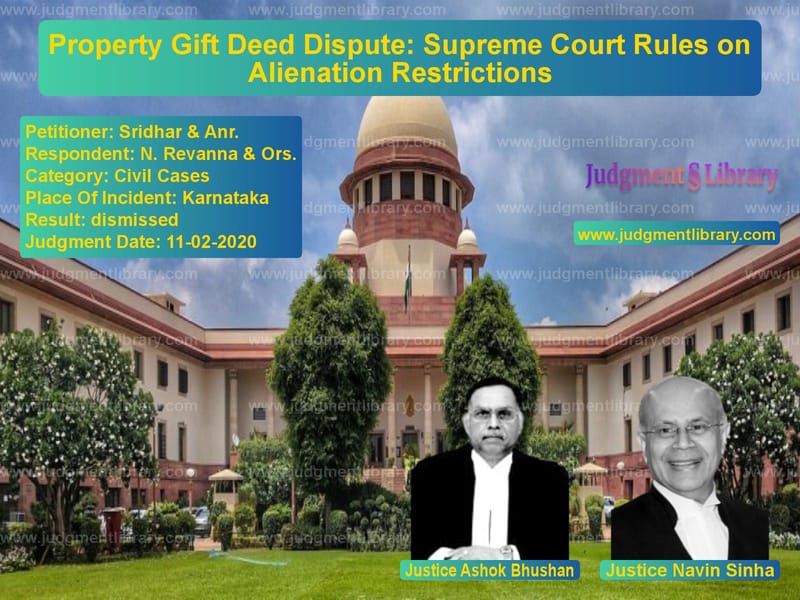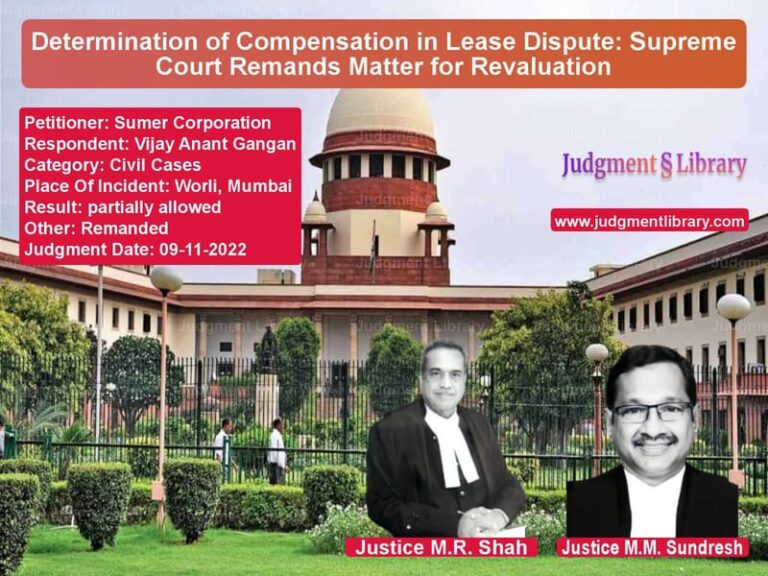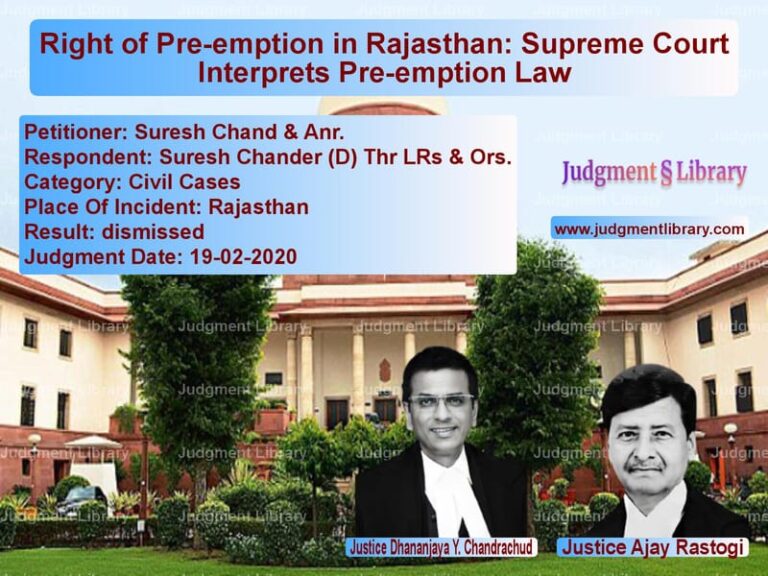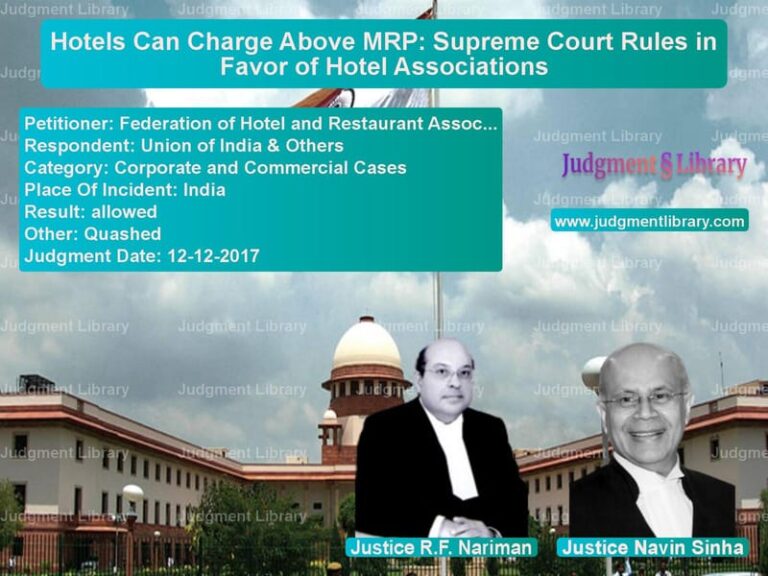Property Gift Deed Dispute: Supreme Court Rules on Alienation Restrictions
The case of Sridhar & Anr. vs. N. Revanna & Ors. is a landmark judgment on property law, particularly regarding the conditions imposed in a gift deed. The Supreme Court addressed whether a condition in a gift deed that prevents the donee from alienating the property is legally valid. The ruling clarified the applicability of Sections 10 and 13 of the Transfer of Property Act, 1882, in cases where restrictions are placed on the donee’s ability to sell, mortgage, or transfer property.
Background of the Case
The dispute arose over a piece of property originally owned by one Muniswamappa, the great-grandfather of the plaintiffs and the grandfather of defendant No. 1, N. Revanna. Muniswamappa executed a gift deed on 5th June 1957 in favor of his grandson, N. Revanna. The deed contained a condition prohibiting the donee (Revanna) and his younger brothers from alienating the property.
However, in 1985, Revanna sold portions of the property to defendants Nos. 2 to 5, leading the plaintiffs (Revanna’s sons) to file a suit challenging the validity of these sales. They argued that the condition in the gift deed was binding and that the sales made by their father were null and void.
The plaintiffs sought the following reliefs:
- A declaration that they were the absolute owners of the property.
- A declaration that the sale deeds executed in 1985 were null and void.
- A permanent injunction preventing the vendees (defendants Nos. 2 to 5) from taking possession of the property.
Arguments of the Petitioner (Sridhar & Anr.)
- The plaintiffs argued that the gift deed executed by Muniswamappa explicitly restricted Revanna from alienating the property.
- They contended that since their father had received the property under the condition that it could not be sold, the sales made in 1985 were invalid.
- They also claimed that as legal heirs, they had absolute ownership over the property and the transactions carried out by their father were not binding on them.
- They further contended that the gift deed was not valid under Section 13 of the Transfer of Property Act, 1882, as it sought to benefit unborn persons.
Arguments of the Respondent (N. Revanna & Ors.)
- The respondents argued that the restriction imposed in the gift deed was void under Section 10 of the Transfer of Property Act, 1882, which invalidates conditions that absolutely restrain alienation.
- They contended that once the property was gifted, the donee had absolute ownership, including the right to sell or transfer it.
- They also stated that the property had already been sold, and the vendees had acquired legal ownership.
Supreme Court’s Judgment
A bench comprising Justice Ashok Bhushan and Justice Navin Sinha ruled in favor of the respondents, holding that the condition in the gift deed restricting alienation was void under Section 10 of the Transfer of Property Act, 1882. The Court made the following key observations:
“According to Section 10, any condition restraining the transferee from alienating the property is void. A donee, once gifted a property, has full ownership rights, including the right to sell.”
The Court also rejected the argument that the gift was invalid under Section 13 of the Transfer of Property Act, stating:
“The gift was made in favor of a living person (Revanna) and not an unborn person. The reference to younger brothers and their male heirs was only a condition, not a transfer in favor of an unborn person.”
The Court held that the sale transactions executed by Revanna in 1985 were valid and binding. It ruled that the plaintiffs had no claim over the property and dismissed their suit.
Key Legal Takeaways
- Absolute ownership in a gift deed: Once a property is gifted, the donee becomes the absolute owner unless the transfer specifies a life interest.
- Restriction on alienation is void: A condition in a gift deed preventing the donee from selling or transferring the property is invalid under Section 10 of the Transfer of Property Act.
- Section 13 does not apply: If a gift is made to a living person and merely references unborn successors, it does not violate the rule against transferring property to an unborn person.
Impact of the Judgment
This ruling has significant implications for property transactions, particularly in family settlements involving gift deeds. It reinforces the principle that a donee has complete ownership rights and cannot be subjected to absolute restraints on alienation. The decision also provides clarity on how conditions imposed in gift deeds are treated under the law.
Conclusion
The Supreme Court’s decision in Sridhar & Anr. vs. N. Revanna & Ors. is an important ruling in property law. It upholds the principle that once a gift is made, the recipient has full ownership rights, and any restriction on alienation is legally unenforceable. This judgment will serve as a precedent for similar disputes in the future, ensuring that property transfers remain legally sound and do not include invalid conditions.
Petitioner Name: Sridhar & Anr..Respondent Name: N. Revanna & Ors..Judgment By: Justice Ashok Bhushan, Justice Navin Sinha.Place Of Incident: Karnataka.Judgment Date: 11-02-2020.
Don’t miss out on the full details! Download the complete judgment in PDF format below and gain valuable insights instantly!
Download Judgment: Sridhar & Anr. vs N. Revanna & Ors. Supreme Court of India Judgment Dated 11-02-2020.pdf
Direct Downlaod Judgment: Direct downlaod this Judgment
See all petitions in Property Disputes
See all petitions in Landlord-Tenant Disputes
See all petitions in Succession and Wills
See all petitions in Contract Disputes
See all petitions in Specific Performance
See all petitions in Judgment by Ashok Bhushan
See all petitions in Judgment by Navin Sinha
See all petitions in dismissed
See all petitions in supreme court of India judgments February 2020
See all petitions in 2020 judgments
See all posts in Civil Cases Category
See all allowed petitions in Civil Cases Category
See all Dismissed petitions in Civil Cases Category
See all partially allowed petitions in Civil Cases Category







